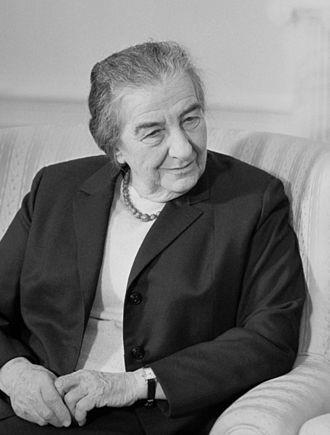
Golda Meir (born Golda Mabovitch; May 3, 1898 – December 8, 1978) was an Israeli stateswoman, politician, teacher, and kibbutznik who served as the fourth prime minister of Israel
Born in Kyiv she emigrated to the United States as a child with her family in 1906, and was educated there, becoming a teacher. After getting married, she and her husband emigrated to then Palestine in 1921, settling on a kibbutz. Meir was elected prime minister of Israel on March 17, 1969, after serving as labour minister and foreign minister. The world's fourth and Israel's only woman to hold the office of prime minister, and the first in any country in the Middle East, she has been described as the "Iron Lady" of Israeli politics. Former Prime Minister David Ben-Gurion used to call Meir "the best man in the government"; she was often portrayed as the "strong-willed, straight-talking, grey-bunned grandmother of the Jewish people." Meir resigned as prime minister in 1974, the year following the Yom Kippur War. She died in 1978 of Lymphoma.
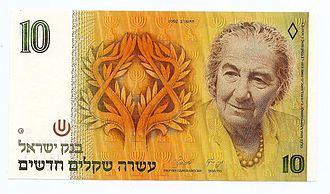
Golda Mabovitch was born to a Jewish family in the downtown of Kyiv (present-day Ukraine) on May 3, 1898 to Blume Neiditch (died 1951) and Moshe Mabovitch (died 1944), a carpenter. Meir wrote in her autobiography that her earliest memories were of her father boarding up the front door in response to rumours of an imminent pogrom. She had two sisters, Sheyna (1889–1972) and Tzipke (1902–1981), as well as five other siblings who died in childhood. She was especially close to Sheyna.
Moshe Mabovitch left to find work in New York City in 1903. In his absence, the rest of the family moved to Pinsk to join her mother's family. In 1905, Moshe moved to Milwaukee, Wisconsin, in search of higher-paying work, and found employment in the workshops of the local railroad. The following year, he had saved up enough money to bring his family to the United States.
Golda's mother Blume Mabovitch ran a grocery store on Milwaukee's north side, where by the age of eight Golda had been put in charge of watching the store when her mother went to the market for supplies. Golda attended the Fourth Street Grade School (now Golda Meir School) from 1906 to 1912. A leader early on, she organized a fundraiser to pay for her classmates' textbooks. After forming the American Young Sisters Society, she rented a hall and scheduled a public meeting for the event. She graduated as valedictorian of her class.
Her mother wanted Golda to leave school and marry, but she declined. She bought a train ticket to Denver, Colorado, and went to live with her married sister, Sheyna Korngold. The Korngolds held intellectual evenings at their home, where Meir was exposed to debates on Zionism , literature, women's suffrage, trade unionism, and more. In her autobiography, she wrote: "To the extent that my own future convictions were shaped and given form ... those talk-filled nights in Denver played a considerable role." In Denver, she also met Morris Meyerson (also "Myerson"; December 17, 1893, Chicago, Illinois, US – May 25, 1951, Israel), a sign painter, whom she later married on December 24, 1917
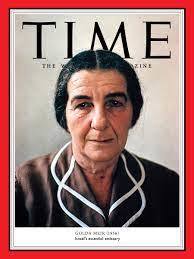
She attended the teachers college Milwaukee State Normal School (nowUniversity of Wisconsin-Milwaukee ) in 1916, and probably part of 1917. In 1917, she took a position at a Yiddish-speaking Folks Schule in Milwaukee. While at the Folks Schule, she came more closely into contact with the ideals of Labor Zionism. In 1913, she had begun dating Morris Meyerson (Myerson). She was a committed Labor Zionist and he was a dedicated socialist. During this time, she also worked part-time at the Milwaukee Public Libary.
The couple moved to Palestine in 1921, together with her sister Sheyna, In the Britsh Mandate of Palestine. Meir and her husband joined a kibbutz. Their first application to kibbutz Merhavia in the Jereel Valley was rejected, but later they were accepted. Her duties included picking almonds, planting trees, working in the chicken coops, and running the kitchen. Recognizing her leadership abilities, the kibbutz chose her as its representative to the Histadrut the General Federation of Labour.
Meir said in the 1975 edition of her autobiography My Life that "It is not only a matter, I believe, of religious observance and practice. To me, being Jewish means and has always meant being proud to be part of a people that has maintained its distinct identity for more than 2,000 years, with all the pain and torment that has been inflicted upon it"
In 1924, the couple left the kibbutz and lived briefly in Tel Aviv before settling in Jerusalem. There they had two children, a son Menachem (1924–2014) and a daughter Sarah (1926–2010). In 1928, Meir was elected secretary of Moetzet HaPoalot (Working Women's Council), which required her to spend two years (1932–34) as an emissary in the United State. The children went with her, but Morris stayed in Jerusalem. Morris and Golda grew apart, but never divorced. Morris died in 1951.
In 1934, when Meir returned from the United States, she joined the Executive Committee of the Histadrut and moved up the ranks to become the head of its Political Department. This appointment was important training for her future role in Israeli leadership.
In July 1938, Meir was the Jewish observer from Palestine at the Evian, called by President Franklin D. Roosevelt of the United States to discuss the question of Jewish refugees' fleeing Nazi persecution. Delegates from the 32 invited countries repeatedly expressed their sorrow for the plight of the European Jews, but outlined why their countries could not help by admitting the refugees.The only exception was the Dominican Republic, which pledged to accept 100,000 refugees on generous terms. Meir was disappointed at the outcome and she remarked to the press, "There is only one thing I hope to see before I die and that is that my people should not need expressions of sympathy anymore."

In June 1946, the British arrested many leaders of the Zionist Yishuz. Meir took over as acting head of the Political Department of the Jewish Agency. during the incarceration of Mashue Sharett. Thus she became the principal negotiator between the Jews in Palestine and the British Mandatory authorities. After his release, Sharett went to the United States to attend talks on the UN Partition Plan, leaving Meir to head the Political Department until the establishment of the state in 1948.
In January 1948, the treasurer of the Jewish Agency was convinced that Israel would not be able to raise more than seven to eight million dollars from the American Jewish community. Meir traveled to the United States, and she raised $50,000,000, which was used to purchase arms in Europe for the young country. Ben-Gurion wrote that Meir's role as the "Jewish woman who got the money which made the state possible" would go down one day in the history books.
On May 10, 1948, four days before the official establishment of Israel, Meir traveled to Amman. disguised as an Arab woman, for a secret meeting with King Abdullah of Transjordan, at which she urged him not to join the other Arab countries in attacking the Jews. Abdullah asked her not to hurry to proclaim a state. Meir replied: "We've been waiting for 2,000 years. Is that hurrying?"
As the head of the Jewish Agency Political Department, Meir called the mass exodus of Arabs before the War of Independence in 1948 "dreadful", and she likened it to what had befallen the Jews in Nazi-occupied Europe.
Meir was one of 24 signatories (including two women) of the Israeli Declaration of Independence on May 14, 1948. She later recalled, "After I signed, I cried. When I studied American history as a schoolgirl and I read about those who signed the U S Declaration of Independence. I couldn't imagine these were real people doing something real. There I was sitting down and signing a declaration of establishment." Israel was attacked the next day by the joint armies of neighboring countries in what became the 1948 Arab-Israeli War. During the war, Israel stopped the combined Arab assault, and then it launched a series of military offensives to defeat the invading Arab armies and to end the war.
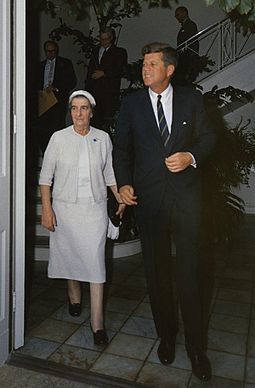
In 1949, Meir was elected to the Knesset as a member of Mapai and served continuously until 1974. From 1949 to 1956, she served as Minister of Labour. While serving in this position, Meir carried out welfare state policies, orchestrated the integration of immigrants into Israel's workforce In 1955, on Ben-Gurion's instructions, she stood for the position of mayor of Tel Aviv. She lost by the two votes of the religious bloc who withheld their support on the grounds that she was a woman. (Mayors then were elected by the city council, rather than elected directly as has been the case since 1978. In 1956, she became Foreign Minister under Prime Minister David Ben-Gurion. Her predecessor, Moshe Sharett, had asked all members of the foreign service to take a Hebrew surname. Upon her appointment as foreign minister, she shortened "Meyerson/Myerson" to "Meir", which means "illuminate".
As foreign minister, Meir promoted ties with the newly established states in Africa in an effort to gain allies in the international community. She also believed that Israel had experience in nation-building that could be a model for the Africans. In her autobiography, she wrote:"Like them, we had shaken off foreign rule; like them, we had to learn for ourselves how to reclaim the land, how to increase the yields of our crops, how to irrigate, how to raise poultry, how to live together, and how to defend ourselves." Israel could be a role model because it "had been forced to find solutions to the kinds of problems that large, wealthy, powerful states had never encountered"
On October 29, 1957, Meir's foot was slightly injured when a Mills Bomb was thrown into the debating chamber of the Knesset. David Ben-Gurion and Moshe Carmel were more seriously injured. In the early 1960s, Meir was diagnosed with Lymphoma. In January 1966, she retired from the Foreign Ministry, citing exhaustion and ill health. She soon returned to public life as secretary-general of Mapai, supporting Prime Minister Levi Eshkol in party conflicts. After Levi Eshkol's sudden death on February 26, 1969, the party elected Meir as his successor. Meir came out of retirement to take office on March 17, 1969, serving as prime minister until 1974.

In 1969 and the early 1970s, Meir met with many world leaders to promote her vision of peace in the Middle East, including Richard Nixon (1969), Nicolae Ceausescu (1972) and Pope Paul VI (1973). In 1973, she hosted the chancellor of West Germany, Willy Brandt, in Israel.
In August 1970, Meir accepted a U.S. peace initiative that called for an end to the War of Attrition and an Israeli pledge to withdraw to "secure and recognized boundaries" in the framework of a comprehensive peace settlement. The Gahal party quit the national unity government in protest, but Meir continued to lead the remaining coalition

In the wake of the Munich massacre at the 1972 Summer Olympics. Meir appealed to the world to "save our citizens and condemn the unspeakable criminal acts committed". Outraged at the perceived lack of global action, she ordered the Mossad to hunt down and assassinate suspected leaders and operatives of Black September and the PFLP.
In the days leading up to the Yom Kippur War. Israeli intelligence could not conclusively determine that an attack was imminent. However, on October 5, 1973, Meir received official news that Syrian forces were massing on the Golan Height. The prime minister was alarmed by the reports, and believed that the situation was similar to what preceded the Six Day War. Her advisers, however, assured her not to worry, saying that they would have adequate notice before a war broke out. This made sense at the time; after the Six-Day War, most Israelis felt it unlikely that the Arabs would attack. Consequently, although the Knesset passed a resolution granting her power to demand a full-scale call-up of the military (instead of the typical cabinet decision), Meir did not mobilize Israel's forces early. Soon, though, the threat of war became very clear. Six hours before the outbreak of hostilities, Meir met with Minister of Defense Moshe Dayan and General David Elaza. While Dayan continued to argue that war was unlikely and favored calling up the air force and only two divisions, Elazar advocated full-scale army mobilization and the launch of a full-scale preemptive strike on Syrian forces.
Meir approved full-scale mobilizing but sided with Dayan against a preemptive strike, citing Israel's need for foreign aid. She believed that Israel could not depend on European countries to supply Israel with military equipment, and the only country that might come to Israel's assistance was the United States. Fearing that the United States would be wary of intervening if Israel were perceived as initiating the hostilities, Meir decided on October 6 against a preemptive strike. She made it a priority to inform Washington of her decision. U.S. Secretary of State Henery Kissinger later confirmed Meir's assessment by stating that if Israel had launched a preemptive strike, Israel would not have received "so much as a nail"
The Aranat Commission appointed to investigate the war cleared Meir of "direct responsibility". It said about her actions on Yom Kippur morning: She decided wisely, with common sense and speedily, in favour of the full mobilization of the reserves, as recommended by the chief-of-staff, despite weighty political considerations, thereby performing a most important service for the defence of the state.
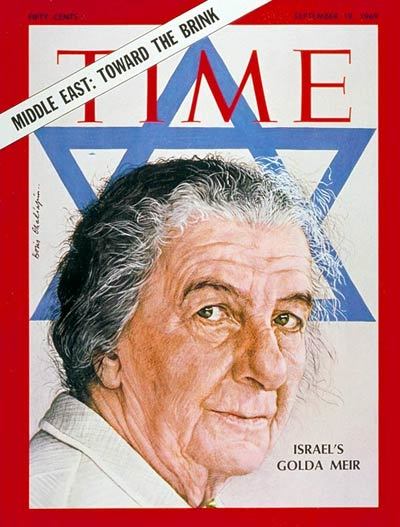
Her party won the elections in December 1973, but Meir resigned on April 11, 1974. She believed that was the "will of the people" and that she had served enough time as premier. She believed the government needed to form a coalition. She said, "Five years are sufficient ... It is beyond my strength to continue carrying this burden. On November 19, 1977, President of Egypt Anwar Sadat became the first Arab leader to visit Israel in an official capacity. Meir was the first to speak for the Labor Party.. She congratulated Sadat as the first Arab leader to come to Israel for the sake of the next generations' avoiding war. Meir praised Sadat for his courage and vision, and expressed the hope that while many differences remained to be resolved, that vision would be achieved in a spirit of mutual understanding.
In 1974, Meir was awarded the honor of World Mother by American Mothers. In 1974 Meir was awarded the James Madison Award for Distinguished Service. In 1975, Meir was awarded the Israel Prize for her special contribution to society and the State of Israel. In 1985, Meir was inducted into the Colorado Women's Hall of Fame.
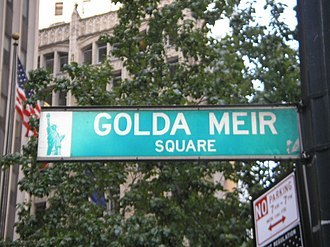
About the Cache.
The final cordinantes are N42 59.080 W71 22.243
N 42 59..XXX' W 71° 22.243
Solve for XXX The number would come after 079 and before 081
Congratulations to SoxPhan and solid-rock-seekers for the first and second to find.